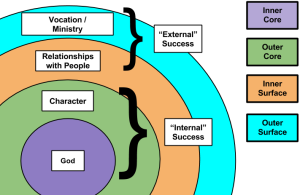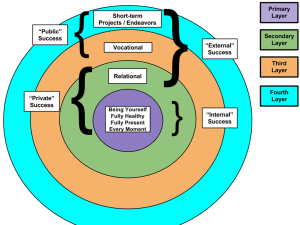How to Change the World
Analyzing the Chicago Blackhawks One Goal Ad Campaign
It was very painful for me to watch the Blackhawks get eliminated in round one of the 2016 playoffs last week. They made it a close series in the end, but, the defending Stanley Cup champions came up short – in the first round. How could this happen?

If you live in Chicago, you have likely seen one or more commercials from the Blackhawks “One Goal” advertising campaign. It’s been one of the most successful advertising campaigns in the history of hockey. The campaign talks about the primary professional goal of the Blackhawks organization and of the players is to win the Stanley Cup – the world championship trophy for hockey.
But, of course, that is not really the primary professional goal of the organization and players.
Please hang with me here – do not assume the point of this post is to bash sports, or money or any of that. If we can never discuss these things openly, we will never be able to get better. Don’t just tune out here – please consider the following perspective.
When the Blackhawks first won the Stanley Cup in 2010, I’ll admit I didn’t know a great deal about professional hockey. I watched games here and there and casually followed the team in the past. When the Hawks had the opportunity to win the cup, I jumped on the bandwagon like many other people. Not as a first-time hockey fan – I actually played rat hockey in my young adult years – but as a big time professional hockey fan.
The day after the Hawks took home their first Cup in 2010, I woke up early to get the localnewspapers. I did that for the Bulls every time they won a championship too – as a keepsake for my two sons who really love sports.
I remember thinking – man, we have the talent for a real dynasty-in-the-making here. Like the old SNL Superfans skit when the Bulls won their first championship – “We’re talking a minimum 8-peat.”
I read one of the articles after I bought the papers that morning, and one of the sportswriters said something to the effect of, “The Blackhawks will spend a few days celebrating, then, as we all know, they will gut the team and get ready for next season.”
G-g-g-g-g-ut the team? I didn’t know that. Why on earth would anyone want to do that? Let’s keep these guys together and go for the 8-peat! Well, it’s not that simple – you see – there are economic factors at play.
Let’s consider the two primary economic factors:
- Other teams are willing to pay Cup-winning Blackhawks players much more money than they currently are making on the Blackhawks
- All professional hockey teams has what is called a “Salary cap”. There is a limit to how much any team can spend on player salaries.
So, when a team, like the Blackhawks wins a world championship, the “value” of most of the players on the team immediately goes up. Since the team was already close to the salary cap at the beginning of the season, that leaves two options:
a) The players must refuse offers of more money from other teams and remain on the Blackhawks with the same salary so the team remains under the salary cap, or
b) Many of the players demand an increase in pay from the Blackhawks to match the offers from the other teams. The Blackhawks organization then decides who they consider too important to trade and raise their salaries. The Blackhawks organization then has to trade away enough other players to other teams and hire less expensive players to replace them – so the whole team is under the salary cap again. Those replacement players typically cost less because they have less playoff experience, so, the new team after the trades is usually less likely to win again next season – unless the organization gets lucky and hires “diamonds in the rough.”
As the sportswriter who wrote the article pointed out, most of the time, we end up with option (b). That means, the Blackhawks are less likely to repeat as champions the following year – ultimately as a result of the players demanding more money.
So the truth is, while winning another championship is A priority, the HIGHEST priority is usually how much money the individual players make.
The players could choose option (a), keep the team together, have a much better chance and winning the championship again the following year – and not have to move their spouses and kids to a new location if traded. They could develop some deep roots for their families and friends by staying in the same area for many years.
Even if you equally split the salary cap across the board, each player would be considered very wealthy – not including product endorsements and other bonuses associated with winning the championship and becoming a dynasty.
So, why doesn’t it happen more often, if ever? Maybe Dwayne Wade did it for a couple years in basketball, but you never see entire teams do it – ever. Why is that? Why always choose option (b)?
I think it is important to ponder that for a while. I do not think it’s an issue that only pro sports players have. I do the same thing – and it would probably only get worse the more money I had on the table. If you see this issue as us against them, you are completely reading this wrong. It’s us against us. This isn’t just professional sports players, it’s almost everyone – including you and me.
I believe it is very rare for anyone to volunteer to make less money than they could in their current positions. Some people wouldn’t change positions to make more money because they value their current jobs for some reason or another. But inside of a particular job, I know very few people who would voluntarily make less in their current job to accomplish some other positive outcomes in that same job.
You would likely be considered foolish if you did, and anyone asking you to do so would be considered selfish. Fear is a big driver. What if you get hurt and can’t play? What if yo play for 5 years and can’t find a good job after pro sports? Fear is one of the major motivations in many of the decisions we all make.
Our culture values “more” – not necessarily more things – although things are important. But we value more time, more opportunities for leisure and “giving back,” etc. More money now gives us more time and freedom later. We can even spiritualize it. Let’s make enough money now so we can retire early and then “give back” of our time, money, resources or all three. It’s not that we really want more for us only, more for us will hopefully mean more for others too, somewhere down the road. At least that’s the plan. And, I believe many people honestly do this.
We can invite more poor people to live with us if we have a bigger house. We can take our kids friends to our vacation houses and invest in them. I mean – you know – it’s not really just for me, is it?
You can’t blame anyone for doing what has been programmed into them by the culture. Our culture values “more” – and it seems to value more of “more” every year. How do we turn that around? How do we change our ways as a society to place the highest value “enough”?
Those are important questions to ponder for me, you, our families, friends, our kids, spouses, etc.
Again, the sports analogy is simply an easier story to tell – like a parable – but it is really the story of us. We need to figure this out.
Anyway, back to our hockey parable. Let’s say the “One Goal” was really winning championships – getting to that elusive SNL “8-peat.” What might that look like?
The 2016 NHL salary cap is $71.4 million a year. The most players a team could carry is 23. For worst case, let’s assume the Hawks carried 23 players. That means, if each player made the exact same salary, that would mean that each would make about $3.1 million a year if they each made the same salary. Not too bad.
If the players really valued winning championships – they could have taken the championship team, and all signed 8 year contracts for $3.1 million a year, and guaranteed the same team dynamic for 8 years – and maybe accomplish the coveted “8-peat.”
In addition, they wouldn’t have to risk being traded. That means, they would not have to move their families, their kids could attend the same schools, and they could have some stability with friends and neighborhoods. It would be a double win.
If it sounds too socialistic to just split it up between the best and the worst players, they could each sign contracts for half the $3.1 million, call it $1.55 million each, and then have the rest ($35 million) in a pool for performance bonuses based on various factors. That way the top performers could make much more than the bottom performers. All in all, everyone would be rich – that doesn’t even count endorsement deals of products, etc.
However, that is not how it pans out in reality. The superstars of the Blackhawks, Patrick Kane and Jonathan Toews each make $10.5 million a year, so the two of them combined eat up $21 million of the annual salary cap of $71.4 million. The second-tier superstars, Seabrook, Crawford and Keith eat up another $19 million between the three of them. This is a total of $40 million, or more than half the salary cap for 5 players. That means that the remaining 18 players need to split up what’s left of the salary cap – about $31 million.
So, you have to find players willing to play for a lot less than the superstars can make. Sometimes the general manager gets lucky and finds diamonds in the rough – but most of the time, you end up with mediocre players, and you don’t win the championship again the following year.
Oh well, so much for the “One Goal.”
We want to believe winning is the Blackhawks true “One Goal.” It makes life easier and more enjoyable. Just like we want to believe that the rich-poor divide isn’t our problem. We’ve earned our money – in fact, we probably should be making more doing whatever it is we do. It’s those richer than us that should cut-back and say enough is enough.
Maybe it makes life easier to believe the not-so-truthful ad slogans about our favorite professional sports teams. And maybe it makes sleeping at night a little easier for all of us to believe that we aren’t part of the problem – or part of the solution – ourselves.
I am reading a book called, “Throwing Rocks and the Google Bus”, by Douglas Rushkoff. It discusses how to address the issue of the income divide between the rich and the poor. It is a fascinating read so far – I am not even all the way through it yet. It talks about issues like the original purpose of corporations, how much is “enough” and other things.
When I accept the principle that I am part of the problem, I am also, simultaneously empowered to be part of the solution.
I would love to collaborate with others and dream up new solutions to the new problems we face in the new world of technology and globalization. Spending too much time looking backwards isn’t going to get it done – me thinks. Blaming other people won’t get it done either.
We need new, creative, attractive, agile solutions that maximize the dignity and value of every individual. I’d love to explore those things with you. Please consider this the first of many posts exploring these issues 🙂











